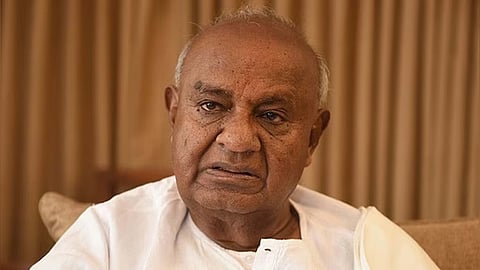
- News Updates
- PSU Watch
- Defence News
- Policy Watch
- हिन्दी न्यूज़
- Jobs Watch
- States News
- Event News

New Delhi: Former Prime Minister HD Deve Gowda on Monday said there are still many areas of concern in the renewable energy sector, and some core challenges need to be addressed to meet the energy demand of 'Viksit Bharat'.
Taking part in a discussion on the working of the Ministry of New and Renewable Energy (MNRE) in the Rajya Sabha, Gowda, however, praised Prime Minister Narendra Modi-led government for several steps taken in the last ten years to drive the growth of India's renewable energy while also lauding for no corruption in power and other sectors.
"Over the years, the importance of renewable energy in India has only grown upwards. In a country of 1.4 billion people, we cannot secure our future if you do not adopt a model of sustainable development," the senior member from JD(S) asserted.
For sustainable development, clean energy is a very important factor, he said, adding that India has gradually evolved from hydel power to solar and wind energy in its pursuit of renewable energy.
"We have so many international commitments also. So, much work has been done in the last ten years under PM Modi for the promotion of renewable energy in this country," Gowda said, citing examples of the increase in installed capacities of non-fossil fuel generation and solar energy.
There is no doubt work has been done on this front, he said, adding that "however, in renewable energy, there are still many areas of concern, and we need to address some core challenges".
Citing a Teri report, he said, "India is currently the third largest energy-consuming country in the world, but 80 per cent of our energy demand is still being met by fossil fuels. It means renewable energy share is only 20 per cent".
While referring to the government's target of achieving 50 per cent of its installed capacity from renewable energy by 2030, Gowda said, "I find no special package for this sector in the current year's Budget".
He further said, "The Teri energy report has estimated that by 2050 'Viksit Bharat' the energy demand will be 400 per cent more than the present demand. Therefore, the ministry will have to speed up its efforts in this regard. This will also require huge capital investment in this sector. I hope the minister will throw some light on this aspect in his reply".
The former prime minister also asserted that for speedy growth in the renewable sector regional disparities need to be addressed, and the states, which are lagging, need proper hand-holding.
Gowda also issued a note of caution, saying a hurried transition to renewable energy should not impact the country's biodiversity, referring to the installations of renewable energy plants in agricultural and eco-sensitive areas.
"So, I suggest that a policy should be incorporated that only degraded land will be utilised for this purpose," he said.
Taking part in the discussion, Niranjan Bishi (BJD) pointed out issues like insufficient funding for emerging technologies, delayed implementation of projects, underestimation of infrastructure needs and land acquisition problems for large-scale energy projects that cause significant delays and cost overruns coming in the way of India's renewable energy sector.
AD Singh (RJD) expressed concern over the import of parts from China and Vietnam required for solar energy production in India and drew the government's attention to the matter.
V Sivadasan CPI(M) alleged the government of indulging in 'crony capitalism' and said it has resulted in not meeting the earlier targets set for the renewable energy sector.
Sumer Singh Solanki (BJP), however, refuted the allegations of the Opposition listing out several schemes undertaken by the Modi-led government, asserting that now, even the poor have rooftop solar power supplies compared to the dark times faced by the poor and farmers during the previous Congress-led governments.
Sagarika Ghose of TMC said at the COP 26 Glasgow meet in 2021, the Prime Minister said India would produce a capacity 500-gigawatt renewable energy capacity by 2030.
The story of this government is missing targets, focussing on big projects and small-scale decentralised renewable projects, she stated.
The government target for installed capacity for renewable energy for 2022 was 100 gigawatts for solar and 60 gigawatts for wind, Ghose stated.
"Where are we in 2024, with only 81.6 gigawatts for solar and 45.8 gigawatts for wind...how the ministry intends to catch up as its target for even 2022 has not been met so far. From April 2023 to March 2024, the total electricity generated from solar was only 6.69 per cent of the total electricity generated in the country.
"Electricity from wind was only 4.71 per cent of the total electricity produced...If you add all the renewables, solar, wind etc, this comes to only 13 per cent of the total electricity produced in the country," Ghose pointed out.
"India's 70 per cent electricity is coming from coal, this is resulting in greenhouse gas emissions, which is engulfing the planet.. we are in danger..and what is the government doing? they are only putting out photographs and announcements meant for international audiences but doing nothing to encourage small-scale renewables," Ghose said.
Milind Deora of Shiv Sena said the government has allotted Rs 19,000 crore for the ministry, which is double from last year.
Today, India's installed non-fossil fuel capacity has surged 400 per cent in the last 8.5 years and now reached 203 gigawatts, he added.
(PSU Watch– India's Business News centre that places the spotlight on PSUs, Bureaucracy, Defence and Public Policy is now on Google News. Click here to follow. Also, join PSU Watch Channel in your Telegram. You may also follow us on Twitter here and stay updated.)
